- Home
- Wendell Berry
New Collected Poems Page 15
New Collected Poems Read online
Page 15
and the loved.
In our joining it knows
itself. It is with us then,
not as the gods
whose names crest
in unearthly fire,
but as a little bird
hidden in the leaves
who sings quietly
and waits
and sings.
THE NECESSITY OF FAITH
True harvests no mere intent may reap.
Finally we must lie down to sleep
And leave the world, all we desire
To darkness, malevolence, and fire.
Who wakes and stands his shadow’s mark
Has passed by mercy through the dark.
We save the good, lovely, and bright
By will in part, in part delight;
But they live through the night by grace
That no intention can efface.
TO THE HOLY SPIRIT
O Thou, far off and here, whole and broken,
Who in necessity and in bounty wait,
Whose truth is light and dark, mute though spoken,
By Thy wide grace show me Thy narrow gate.
RIPENING
The longer we are together
the larger death grows around us.
How many we know by now
who are dead! We, who were young,
now count the cost of having been.
And yet as we know the dead
we grow familiar with the world.
We, who were young and loved each other
ignorantly, now come to know
each other in love, married
by what we have done, as much
as by what we intend. Our hair
turns white with our ripening
as though to fly away in some
coming wind, bearing the seed
of what we know. It was bitter to learn
that we come to death as we come
to love, bitter to face
the just and solving welcome
that death prepares. But that is bitter
only to the ignorant, who pray
it will not happen. Having come
the bitter way to better prayer, we have
the sweetness of ripening. How sweet
to know you by the signs of this world!
THE WAY OF PAIN
1.
For parents, the only way
is hard. We who give life
give pain. There is no help.
Yet we who give pain
give love, by pain we learn
the extremity of love.
2.
I read of Abraham’s sacrifice
the Voice required of him,
so that he led to the altar
and the knife his only son.
The beloved life was spared
that time, but not the pain.
It was the pain that was required.
3.
I read of Christ crucified,
the only begotten Son
sacrificed to flesh and time
and all our woe. He died
and rose, but who does not tremble
for his pain, his loneliness,
and the darkness of the sixth hour?
Unless we grieve like Mary
at His grave, giving Him up
as lost, no Easter morning comes.
4.
And then I slept, and dreamed
the life of my only son
was required of me, and I
must bring him to the edge
of pain, not knowing why.
I woke, and yet that pain
was true. It brought his life
to the full in me. I bore him
suffering, with love like the sun,
too bright, unsparing, whole.
WE WHO PRAYED AND WEPT
We who prayed and wept
for liberty from kings
and the yoke of liberty
accept the tyranny of things
we do not need.
In plentitude too free,
we have become adept
beneath the yoke of greed.
Those who will not learn
in plenty to keep their place
must learn it by their need
when they have had their way
and the fields spurn their seed.
We have failed Thy grace.
Lord, I flinch and pray,
send Thy necessity.
GRIEF
The morning comes. The old woman, a spot
of soot where she has touched her cheek, tears
on her face, builds a fire, sets water to boil,
puts the skillet on. The man in his middle years,
bent by the work he has done toward the work
he will do, weeps as he eats, bread in his mouth,
tears on his face. They shape the day for its passing
as if absent from it—for what needs care, caring,
feeding what must be fed. To keep them, there are only
the household’s remembered ways, etched thin
and brittle by their tears. It is a sharp light
that lights the day now. It seems to shine,
beyond eyesight, also in another day
where the dead have risen and are walking
away, their backs forever turned. What
look is in their eyes? What do they say
as they walk into the fall and flow of light?
It seems that they must know where they are going.
And the living must go with them, not knowing,
a little way. And the dead go on, not turning,
knowing, but not saying. And the living
turn back to their day, their grieving and staying.
FALL
for Wallace Fowlie
The wild cherries ripen, black and fat,
Paradisal fruits that taste of no man’s sweat.
Reach up, pull down the laden branch, and eat;
When you have learned their bitterness, they taste sweet.
AN AUTUMN BURNING
for Kenneth Rexroth
In my line of paperwork
I have words to burn: leaves
of fallen information, wasted
words of my own. I know a light
that hastens on the dark
some work deserves—which God forgive
as we must hope. I start the blaze
and observe the fire’s superlative
hunger for literature. It touches pages
like a connoisseur, turns them.
None can endure. After the passing
of that light, there is sunlight
on the ash, in the distance singing
of crickets and of birds. I turn,
unburdened, to life beyond words.
A WARNING TO MY READERS
Do not think me gentle
because I speak in praise
of gentleness, or elegant
because I honor the grace
that keeps this world. I am
a man crude as any,
gross of speech, intolerant,
stubborn, angry, full
of fists and furies. That I
may have spoken well
at times, is not natural.
A wonder is what it is.
CREATION MYTH
This is a story handed down.
It is about the old days when Bill
and Florence and a lot of their kin
lived in the little tin-roofed house
beside the woods, below the hill.
Mornings, they went up the hill
to work, Florence to the house,
the men and boys to the field.
Evenings, they all came home again.
There would be talk then and laughter
and taking of ease around the porch
while the summer night closed.
But one night, McKinley, Bill’s younger b
rother,
stayed away late, and it was dark
when he started down the hill.
Not a star shone, not a window.
What he was going down into was
the dark, only his footsteps sounding
to prove he trod the ground. And Bill
who had got up to cool himself,
thinking and smoking, leaning on
the jamb of the open front door,
heard McKinley coming down,
and heard his steps beat faster
as he came, for McKinley felt the pasture’s
darkness joined to all the rest
of darkness everywhere. It touched
the depths of woods and sky and grave.
In that huge dark, things that usually
stayed put might get around, as fish
in pond or slue get loose in flood.
Oh, things could be coming close
that never had come close before.
He missed the house and went on down
and crossed the draw and pounded on
where the pasture widened on the other side,
lost then for sure. Propped in the door,
Bill heard him circling, a dark star
in the dark, breathing hard, his feet
blind on the little reality
that was left. Amused, Bill smoked
his smoke, and listened. He knew where
McKinley was, though McKinley didn’t.
Bill smiled in the darkness to himself,
and let McKinley run until his steps
approached something really to fear:
the quarry pool. Bill quit his pipe
then, opened the screen, and stepped out,
barefoot, on the warm boards. “McKinley!”
he said, and laid the field out clear
under McKinley’s feet, and placed
the map of it in his head.
THE FIRST
The first man who whistled
thought he had a wren in his mouth.
He went around all day
with his lips puckered,
afraid to swallow.
WALKING ON THE RIVER ICE
A man could be a god
if the ice wouldn’t melt
and he could stand the cold.
THROWING AWAY THE MAIL
Nothing is simple,
not even simplification.
Thus, throwing away
the mail, I exchange
the complexity of duty
for the simplicity of guilt.
EXCEPT
Now that you have gone
and I am alone and quiet,
my contentment would be
complete, if I did not wish
you were here so I could say,
“How good it is, Tanya,
to be alone and quiet.”
FOR THE FUTURE
Planting trees early in spring,
we make a place for birds to sing
in time to come. How do we know?
They are singing here now.
There is no other guarantee
that singing will ever be.
TRAVELING AT HOME
Even in a country you know by heart
it’s hard to go the same way twice.
The life of the going changes.
The chances change and make a new way.
Any tree or stone or bird
can be the bud of a new direction. The
natural correction is to make intent
of accident. To get back before dark
is the art of going.
JULY, 1773
Seventeen seventy one
and two. In those years the fame
of the Long Hunters passed back
through the settlements, with news
of a rich and delightful country
to the west, on the waters of the Ohio.
My father and uncles held council
over their future prospects.
In the vigor of manhood and full
of enterprise, they longed to see
for themselves. They could not remain
confined in the sterile mountains
of Virginia, where only small parcels
of fertile land and could be found
at any one place. As soldiers
of the Indian Wars, each had
from the governor a grant
of four hundred acres, which had only
to be located and surveyed.
And so,
having first planted their corn
about the tenth of May
in the year 1773, they set out
to visit this land of promise,
five of them, taking along
Sam Adams, a neighbor’s son,
nineteen years of age.
They sought their future homes,
their fortunes, and the honor
of being among the first
in that western wilderness.
They reached the Great Kanahway,
then known as New River,
about the middle of May.
Having sent back their horses,
they selected suitable trees,
felled them, hollowed the trunks,
and so made two canoes
to carry them and their baggage:
rifles, ammunition, tomahawks,
butcher knives, blankets,
fishing tackle, and gigs.
And then, after their rough
overland passage on horseback,
how lightly and quietly they passed
over the surface of the water,
their prows breaking the reflections
of the trees in the early morning.
They entered the Ohio on
the first of June, the opening
of light on that wide water,
its stillness and solitudes.
Opposite the mouth of the Scotia
they saw an old French town
of nineteen or twenty houses,
hewed logs and clapboard roofs,
vacant and deserted, small
and silent among the great trees.
On June thirteenth, a Sunday,
they were met by the bearer of a letter
“to the gentleman settlers”
from Richard Butler, a white man
who had lived at Chilicothe
with the Shawanoes several years:
“They claim an absolute rite
to all that country that you
are about to settle. It does not
lie in the power of those
who sold it to give this land.
Show a friendly countenance
to your present neighbors, the Shawanoes.
It lies in your power to have
good neighbors or bad, as they
are a people very capable
of discerning between good treatment
and ill. They expect you
to be friendly with them,
and to endeavor to restrain
the hunters from destroying the game.”
And this they took to show
the means by which an All-wise
Providence opened the way
for exploitation and settlement.
They camped on July fourth
at Big Bone Lick.
“It was a wonder to see
the large bones that lies there
which has been of several
large big creatures.”
They used the short joints
of the backbones for stools,
and the ribs for tent poles
to stretch their blankets on.
Here they met a Delaware
about seventy years old.
Did he know anything
about these bones? He replied
that when he was a boy “they
were just so as you now see them.”
And so they had come to a place
>
of mystery; they could not
enter except in awe.
At daylight on the morning
of July eighth, they reached
the mouth of the Kentucky River,
which they called the Lewvisa.
This was the foretold stream
that would carry them southward
into the heart of promise.
They set against its current,
reaching by nightfall the mouth
of a stream they called Eagle Creek
for the eagles they saw hovering
there, in the evening light.
And the next day went on
to the mouth of what is now
Drennon Creek, where the river
was nearly closed by a stone bar,
and there they left their boats.
They crossed a bottomland
through a forest of beech trees,
gray trunks in the shade
of gold-green foliage,
and after a mile came to
“a salt lick which was
a wonder to see—a mile
in length and one hundred yards
in breadth, & the roads that came
to that lick no man would believe
who did not see, & the woods
around that place were trod
for many miles, that there
was not as much food
as would feed one sheep.”
They encountered there great numbers
of buffalo, elk, deer,
beaver, wolves, and bears.
The commotion of the herds was astonishing,
their tramplings and outcries,
the flies and the dust. There
where the salts of the ground flowed
to the light, the living blood
of that country gathered, throve
in its seasonal pulse—such
a gathering of beasts as these men
had never seen. Through the nights
they heard them, dreamed them,
seeming to comprehend them
more clearly in dream
than in eyesight, for that upwelling
and abounding, unbidden by any
man, was powerful, bright,
and brief for men like these,
as a holy vision. Waking,
they could not keep it. They did not.
Five days and six
nights they camped there,
examining the lick, killing
game, making several
surveys of land. The uplands

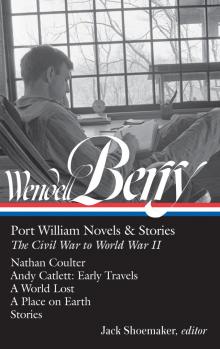 The Selected Poems of Wendell Berry
The Selected Poems of Wendell Berry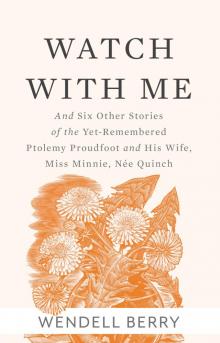 Watch With Me
Watch With Me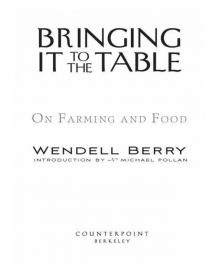 Bringing It to the Table: On Farming and Food
Bringing It to the Table: On Farming and Food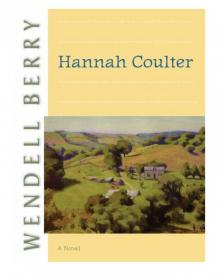 Hannah Coulter
Hannah Coulter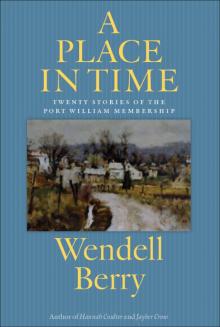 A Place in Time: Twenty Stories of the Port William Membership
A Place in Time: Twenty Stories of the Port William Membership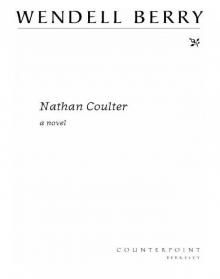 Nathan Coulter
Nathan Coulter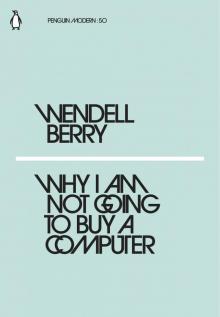 Why I Am Not Going to Buy a Computer
Why I Am Not Going to Buy a Computer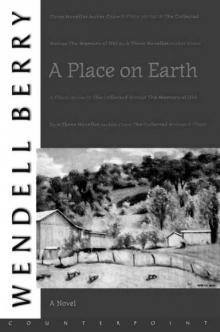 A Place on Earth
A Place on Earth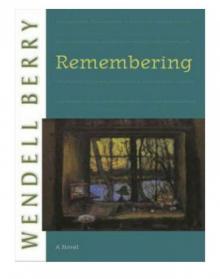 Remembering
Remembering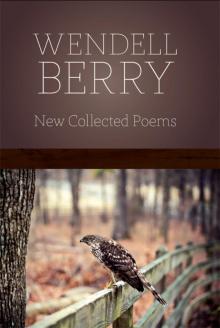 New Collected Poems
New Collected Poems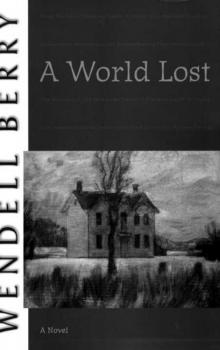 A World Lost
A World Lost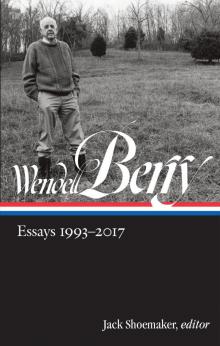 Wendell Berry
Wendell Berry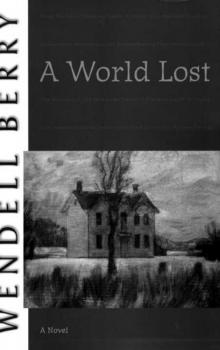 A World Lost: A Novel (Port William)
A World Lost: A Novel (Port William)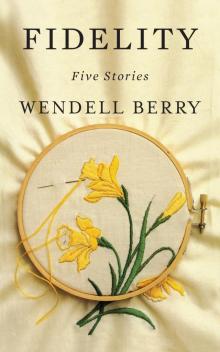 Fidelity
Fidelity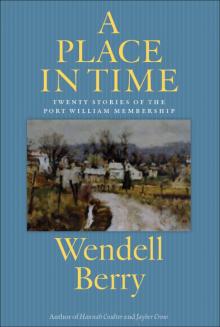 A Place in Time
A Place in Time